In today's fast-paced healthcare environment, mobile workers need reliable communication tools. Wireless headsets are changing the game, letting doctors and nurses stay connected while keeping their hands free. Let's explore how these devices are improving patient care and making healthcare jobs easier.
Key Takeaways
| Aspect | Benefit |
|---|---|
| Mobility | Allows healthcare workers to communicate while on the move |
| Hands-free Operation | Enables multitasking during patient care |
| Technologies | DECT for long-range, Bluetooth for flexibility |
| Key Features | Noise cancellation, long battery life, comfort |
| Security | Ensures patient data protection and HIPAA compliance |
Why Wireless Matters in Healthcare
Healthcare workers are always on the move. They need to talk to colleagues, check patient info, and respond to emergencies quickly. Wireless headsets let them do all this without being tied to a desk or fumbling with a phone.
Imagine a nurse checking on patients. With a wireless headset, they can call for help or get important updates without stopping what they're doing. This means faster responses and better care for patients. In emergency situations, every second counts, and wireless headsets can significantly reduce response times.
Key Technologies: DECT and Bluetooth
There are two main types of wireless tech used in healthcare headsets: DECT and Bluetooth. Each has its own strengths:
DECT Technology
DECT headsets are great for big hospitals. They work over long distances and keep conversations private. DECT technology operates on a dedicated frequency band, reducing interference from other wireless devices commonly found in healthcare settings.
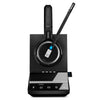
For example, the EPOS IMPACT SDW 5036/5066 Wireless DECT Headset can work up to 180 meters away from its base. It lasts for 14 hours of talking, perfect for long shifts. At £285.00, it's a solid choice for healthcare teams. The extended range allows healthcare workers to move freely between floors or departments without losing connection.
Bluetooth Technology
Bluetooth headsets are super flexible. They can connect to phones, tablets, and computers. This versatility is particularly useful in modern healthcare environments where multiple devices are used for patient care and record-keeping.
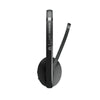
The EPOS ADAPT 261/231 Wireless Bluetooth Headset is a great example. It costs £103.00 and can talk for 27 hours on a single charge. Its noise-cancelling mic helps in noisy hospital settings. The ability to switch seamlessly between devices makes it ideal for healthcare professionals who need to consult various digital resources throughout their shift.
Must-Have Features for Healthcare Headsets
Noise Cancellation
Hospitals can be loud places. Good headsets cut out background noise so you can hear clearly. This feature is crucial for accurate communication, especially in critical care situations where misunderstandings could have serious consequences.
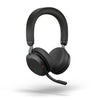
The Jabra Evolve2 75 has active noise cancellation. It blocks out distractions, helping healthcare workers focus. At £228.00, it's a bit pricey, but its 36-hour battery life makes it worth considering. The advanced noise cancellation technology can filter out ambient hospital noises like beeping machines and conversations, ensuring clear communication.
Long Battery Life
Healthcare shifts can be long. Headsets need to keep up without constant charging. Long battery life ensures uninterrupted communication throughout extended shifts, reducing the risk of missing important calls or updates.
The EPOS ADAPT 230/260 series offers super-fast charging. This means less downtime and more talking time during busy shifts. Quick charging capabilities are particularly valuable in healthcare settings where every minute counts.
Comfort and Durability
Headsets should be comfortable for all-day wear and tough enough to handle daily use. In healthcare, where professionals may wear headsets for 12-hour shifts or longer, comfort is not just a luxury but a necessity for maintaining focus and preventing fatigue.
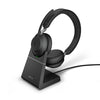
The Jabra Evolve2 65 has memory foam ear cushions for comfort. It's built to last, making it a smart choice for busy healthcare environments. The durable construction ensures the headset can withstand accidental drops and the rigors of daily use in a fast-paced hospital setting.
Keeping Patient Info Safe
When talking about patient health, privacy is super important. Healthcare wireless systems need to follow strict rules like HIPAA. This means using encryption and secure connections to protect patient data. The security features of wireless headsets are not just about protecting conversations; they're about maintaining the integrity of the entire healthcare communication system.
Learn more about secure communication tech to see how it can help your healthcare team work better and safer. Implementing secure communication technology is a critical step in modernizing healthcare practices while ensuring patient confidentiality.
Top Picks for Healthcare Workers
Best DECT Headset

The EPOS IMPACT SDW 5035/5065 Wireless DECT Headset is a top choice. At £250.00, it offers a huge 180m range and 14 hours of talk time. Its wideband audio ensures clear conversations, crucial for accurate communication in healthcare. The extended range is particularly beneficial in large hospital complexes where staff need to move between different areas without losing connection.
Best Bluetooth Headset
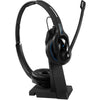
For Bluetooth fans, the Sennheiser/EPOS MB Pro Bluetooth Headset is great. Priced at £123.00, it connects to both mobile phones and PCs, giving healthcare workers flexibility in how they communicate. This versatility is essential in modern healthcare settings where professionals may need to switch between different devices throughout their shift.
Most Versatile Option
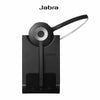
The Jabra Pro 925 Wireless Headset offers the best of both worlds. At £196.00, it works with desk phones and mobile phones, making it perfect for healthcare pros who need to switch between different devices. This adaptability is crucial in healthcare environments where different communication systems may be in use across various departments.
Choosing the Right Headset
When picking a headset for healthcare, think about:
Key Factors for Choosing Healthcare Headsets
- Mobility requirements: Consider how much you move around during work
- Shift duration: Factor in battery life based on length of shifts
- Device compatibility: Determine which devices you need to connect to
- Budget constraints: Consider your available budget for headsets
- Comfort level: Assess how comfortable the headset is for extended use
Remember, the right headset can make your job easier and help you give better care to patients. Consider the specific needs of your healthcare environment, such as the level of background noise, the average distance staff need to cover, and the types of communication systems already in place. Check out our full range of professional headsets to find the perfect fit for your healthcare team.
Setting Up Your New Headsets
Once you've chosen your headsets, it's important to use them right:
- Train all staff on how to use and care for the headsets
- Make sure the headsets work with your current phone systems
- Keep your wireless network up-to-date and secure
- Establish clear protocols for headset use in different healthcare scenarios
- Regularly assess and update your communication systems to ensure optimal performance
Good training and setup will help your team get the most out of their new wireless headsets. Consider appointing a 'headset champion' in each department to assist with troubleshooting and ensure consistent usage across the organization.
The Future of Healthcare Communication
Wireless headsets are just the start. In the future, we might see:
- Headsets that can understand and respond to voice commands, allowing hands-free access to patient records
- Systems that connect directly to patient records, providing real-time updates and alerts
- Headsets with small screens to show important info, such as vital signs or medication schedules
- Integration with AI for instant translation services in multilingual healthcare environments
- Advanced biometric sensors in headsets to monitor healthcare worker stress levels and fatigue
These advances could make healthcare work even smoother and more efficient, leading to improved patient outcomes and a better working environment for healthcare professionals.
Wrapping Up
Wireless headsets are changing how healthcare teams work. They let doctors and nurses move freely, talk clearly, and respond quickly. By choosing the right headsets, healthcare providers can improve patient care and make their jobs easier. The integration of wireless communication technology in healthcare is not just about convenience; it's about creating a more responsive, efficient, and patient-centered care environment.
Ready to upgrade your healthcare communication? Contact us to find the perfect wireless solution for your team. We're here to help you choose headsets that will keep your staff connected and your patients well-cared for. Our experts can provide personalized recommendations based on your specific healthcare setting and communication needs.





